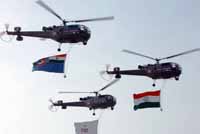Global aircraft makers lobby defense officials as India's biggest air show opens
Aviation companies from around the world flocked to an air show in India Wednesday, hoping for a piece of the billions of dollars in defense contracts the South Asian country plans to spend in modernizing its military.

The five-day event at the Yelahanka air base, located in the outskirts of the southern technology hub of Bangalore, has drawn 500 companies, including 275 foreign companies, more than ever before, Defense Production Secretary K P Singh told reporters.
Forty-five foreign delegations and 35 air force chiefs are also attending the biennial show, which comes as India is emerging as one of the biggest buyers of military hardware in the global market.
New Delhi has plans to buy 126 fighter jets for its air force, a deal worth US$6.5 billion to US$10 billion (EUR 5.4 billion to EUR 8.3 billion).
The Indian government's decision to allow foreign and private investment has also encouraged many global companies to explore partnerships with local firms to set up manufacturing and research facilities.
It is the first time that U.S. combat aircraft makers Lockheed Martin Corp. and Boeing will fly the F-16 and F/A-18 Super Hornet at the Bangalore air show. Both companies are vying for an Indian air force order, reports AP.
But they face stiff competition from the Russian Aircraft Corporation, which manufactures the MiG combat jets and will be showing the MiG-35, the latest fighter jet in Russia's stable. Other rivals are Sweden's Gripen and Eurofighter, made by BAE Systems PLC, Europe's largest defense contractor.
India has never bought American planes for its air force because of its frosty relations with Washington during the Cold War, when New Delhi was viewed as a close ally of the former Soviet Union. Russian-made MiGs dominate the Indian fleet that also includes French Mirage jets and British Jaguars.
Despite improving relations in recent years, India has been reluctant to sign deals with U.S. arms suppliers over fears that Washington could impose sanctions as it did in 1998 after India tested nuclear weapons, choking off vital spare parts and technology.
Subscribe to Pravda.Ru Telegram channel, Facebook, RSS!




